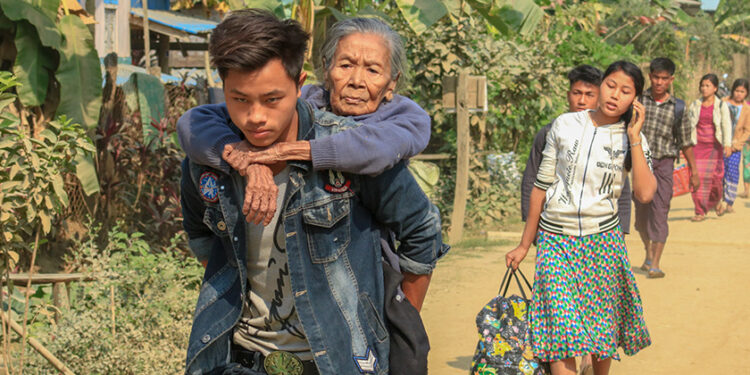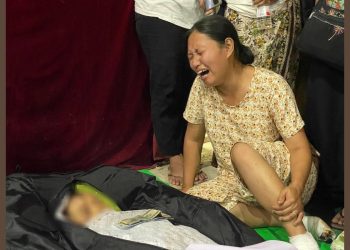YANGON—Despite the fact that the Rakhine State Parliament last month voted in favor of using the state’s 3-billion-kyat (US$1.96 million) disaster management fund to assist 10,000 internally displaced persons (IDPs) in northern Rakhine, the state cabinet has opted not to touch the money, preferring to request funds from the Union government.
Regional lawmaker U Phoe San of the Arakan National Party (ANP) explained that the vast majority of regional lawmakers on Feb. 27 voted in favor of the proposal urging the state government to spend disaster management funds on the IDPs.
State cabinet member U Aung Kyaw San requested the speaker not approve the proposal, saying the Union government was also considering contributing to the relief effort for displaced Arakanese villagers. He pointed out that the state government had provided assistance on only one occasion, providing 50,000 kyats in cash to each IDP in early February. Since then, the IDPs have been relying mainly on donations from local relief groups.
Rakhine State Parliament Deputy Speaker U Mya Than said he had been told that Union Social Welfare Minister Dr. Win Myat Aye recently offered to provide relief funds when Rakhine State Chief Minister U Nyi Pu, a National League for Democracy (NLD) appointee, visited the minister in Naypyitaw.
As of this week, the cabinet members still have not explained whether they plan to use the Union funds. U Mya Than said the state government had spent several hundred million kyats on other projects and still had more than 2.5 billion kyats available for spending.
When asked whether the state government had ignored the state parliament’s endorsement of the use of state funds for IDPs, the deputy speaker remarked that lawmakers would have to wait and see what action the state government takes. He pointed out that the IDP population is now over 10,000 in northern Rakhine State.
“We have to wait and see whether they desire to allocate relief funds from the state budget or not,” said U Mya Than.
Rakhine State Municipality Affairs Minister U Win Myint acknowledged that his government recently received about 14 million kyats and a one-month supply of rice for 4,000 IDPs but said the fate of the other 6,000 IDPs is still uncertain.
According to him township-level authorities—especially from the General Administration Department (GAD)—have not provided timely IDP numbers. He claimed that ground-level reports indicated only 6,332 IDPs as of March 5.
U Win Myint said local authorities in different townships were providing humanitarian assistance to the IDPs. But he said he had no idea whether these funds were being allocated from the 3-billion-kyat disaster management fund or from a separate fund.
Although regional minister U Win Myint claimed local authorities are helping IDPs on the ground, local relief worker Ko Zaw Tun from Mrauk-U Township said that in reality the contribution from local authorities had been poor. Thus, self-motivated Arakanese youth volunteers had collect donations from locals and distributed food for the IDPs daily.
His hometown of Mrauk-U alone had received more than 3,200 IDPs from 10 villages in recent days. Nearly 2,000 IDPs are currently seeking refuge in eight monasteries downtown and in the schools of Mrauk-U. More than 1,000 other IDPs are staying in neighboring villages without proper shelter, safe drinking water or sanitation facilities. As a consequence, some displaced children are suffering from diarrhea. Fortunately, a doctor from Mrauk-U was treating the ill.
“I don’t see any humanitarian assistance from local authorities here. Even international relief agencies like the International Red Cross (ICRC) just showed up once and distributed some buckets to the IDPs in Shwe Taung monastery in town this week,” said Ko Zaw Tun.
He said locals speculated that the ICRC relief was delayed because authorities were intentionally blocking it. With the exception of the ICRC and the World Food Program, international relief agencies have been barred from northern Rakhine State since January. And even these two groups are only allowed partial access. Rice vessels are blocked from traveling to upper Kyauktaw and Chin State’s Paletwa.
Ko Zaw Tun said many locals are already struggling to get by and cannot afford to share food for long. He pointed out that if the authorities or relief agencies fail to set up IDP camps, and the fighting continues until the monsoon season, then displaced villagers will really be in trouble.
He urged state Chief Minister U Nyi Pu and the Union government to immediately assist those caught in the armed violence, regardless of race or religion. He said he had learned that Japan had made a huge donation to the Social Welfare Ministry and hoped those funds would be used properly to help IDPs.
“We just need help, no matter whether it comes from the state level or the Union,” he said.
But as a priority, he requested the authorities take a look at the situation in Bon Kyaung village. He had received complaints that a military unit was stationed near the village and was questioning every single villager attempting to visit a neighboring village or go to the market.
He explained that previous military units had also encamped in many villages and bought chicken, rice and other commodities at street prices, and treated the locals reasonably. However, the military unit currently stationed in Bon Kyaung village was treating people badly, taking chickens and rice without paying for them, he said.
The European Union, Canada and Norway issued a joint statement on Thursday morning encouraging the Arakan Army and the Myanmar military to halt their armed conflict, as it was worsening the humanitarian situation in Chin State’s Paletwa and in Rakhine. They also urged the AA to stop targeting police officers and civilian authorities and individuals.
It said the AA’s killing on March 9 of nine police officers in Ponnagyun Township, Rakhine State, could not be justified. The EU urged the AA and the Union government to resolve their historical grievances through dialogue and an inclusive political process.
The joint statement urged both sides to respect their obligations under international humanitarian law to protect civilians and allow the delivery of humanitarian aid. It mentioned that restrictions on humanitarian work by aid agencies in five townships—Rathedaung, Buthidaung, Maungdaw, Ponnagyun and Kyauktaw—were having “a serious impact on the already precarious humanitarian situation of at least 95,000 people.”
To prevent further deterioration, seasonal agricultural and rehabilitation works “must be allowed to be carried out before the start of the rainy season,” it said.

















